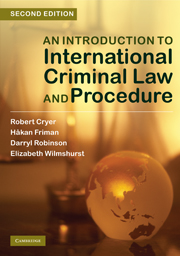Book contents
- Frontmatter
- Contents
- Preface to the Second Edition
- Table of Cases
- Table of Treaties and other International Instruments
- Table of Abbreviations
- PART A INTRODUCTION
- PART B PROSECUTIONS IN NATIONAL COURTS
- PART C INTERNATIONAL PROSECUTIONS
- PART D SUBSTANTIVE LAW OF INTERNATIONAL CRIMES
- 10 Genocide
- 11 Crimes Against Humanity
- 12 War Crimes
- 13 Aggression
- 14 Transnational Crimes, Terrorism and Torture
- PART E PRINCIPLES AND PROCEDURES OF INTERNATIONAL PROSECUTIONS
- PART F RELATIONSHIP BETWEEN NATIONAL AND INTERNATIONAL SYSTEMS
- Index
- References
11 - Crimes Against Humanity
from PART D - SUBSTANTIVE LAW OF INTERNATIONAL CRIMES
Published online by Cambridge University Press: 05 June 2012
- Frontmatter
- Contents
- Preface to the Second Edition
- Table of Cases
- Table of Treaties and other International Instruments
- Table of Abbreviations
- PART A INTRODUCTION
- PART B PROSECUTIONS IN NATIONAL COURTS
- PART C INTERNATIONAL PROSECUTIONS
- PART D SUBSTANTIVE LAW OF INTERNATIONAL CRIMES
- 10 Genocide
- 11 Crimes Against Humanity
- 12 War Crimes
- 13 Aggression
- 14 Transnational Crimes, Terrorism and Torture
- PART E PRINCIPLES AND PROCEDURES OF INTERNATIONAL PROSECUTIONS
- PART F RELATIONSHIP BETWEEN NATIONAL AND INTERNATIONAL SYSTEMS
- Index
- References
Summary
Introduction
Overview
Crimes against humanity are as old as humanity itself. However, it is only in the last seven decades that the international legal prohibition on crimes against humanity has emerged, and it is only in the last fifteen years that the precise contours of the crime have been clarified.
Whereas genocide and war crimes have been codified in conventions with widely accepted definitions, crimes against humanity have appeared in a series of instruments with somewhat inconsistent definitions. The law of crimes against humanity was initially created to fill certain gaps in the law of war crimes, but many parameters were left undefined. The recent increase in the application of international criminal law has produced a fruitful interplay between international instruments, jurisprudence and commentaries, leading to a more coherent picture of the scope and definition of crimes against humanity today.
A crime against humanity involves the commission of certain inhumane acts, such as murder, torture, rape, sexual slavery, persecution and other inhumane acts, in a certain context: they must be part of a widespread or systematic attack directed against a civilian population. It is this context that elevates crimes that might otherwise fall exclusively under national jurisdiction to crimes of concern to the international community as a whole. An individual may be liable for crimes against humanity if he or she commits one or more inhumane acts within that broader context. It is not required that the individual be a ringleader or architect of the broader campaign.
- Type
- Chapter
- Information
- An Introduction to International Criminal Law and Procedure , pp. 230 - 266Publisher: Cambridge University PressPrint publication year: 2010



